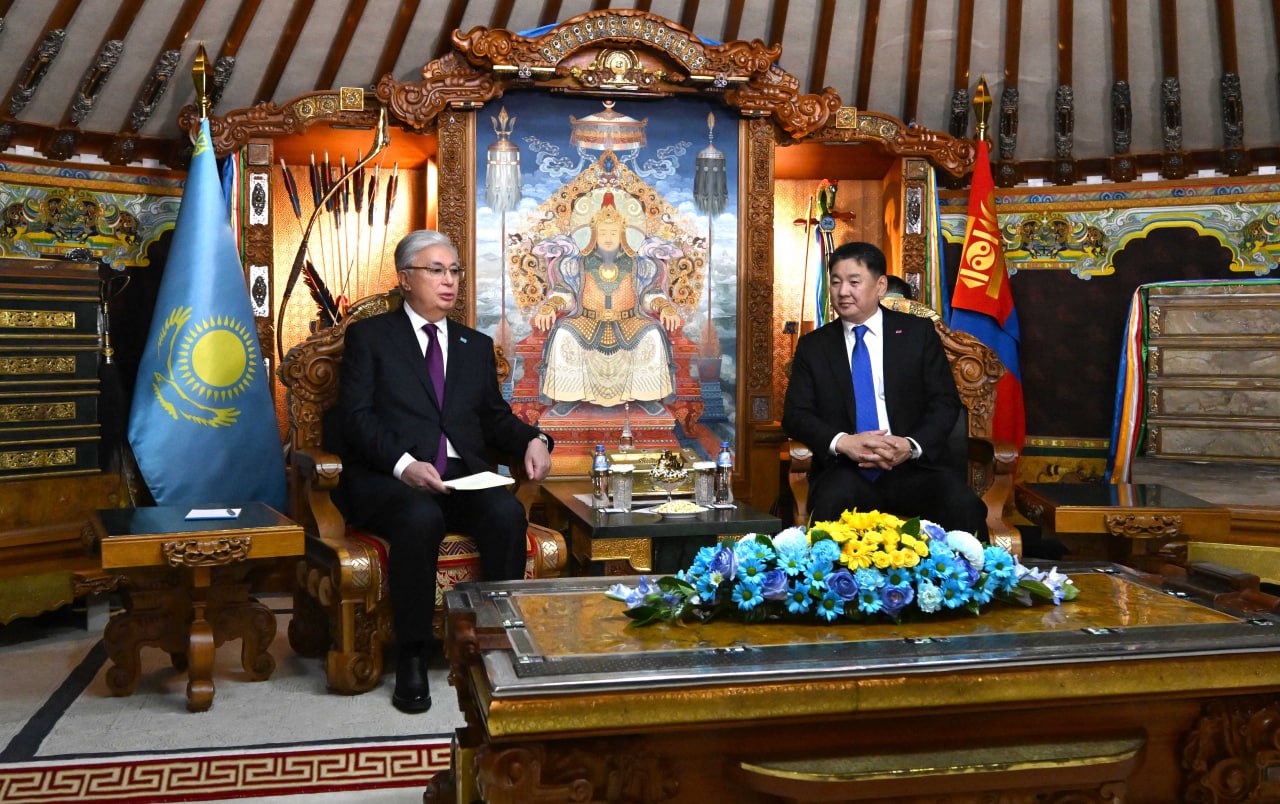During Kazakh President Kassym-Jomart Tokayev’s visit to Mongolia on Oct. 28-29 for a meeting with President Ukhnaagiin Khürelsükh, Tokayev emphasized the need to increase cooperation in the mining industry alongside other important economic sectors. He noted that both sides require anchor projects capable of providing a significant boost to the development of economic cooperation. Kazakhstan became Mongolia’s first strategic partner country in Central Asia.

During Kazakh President Kassym-Jomart Tokayev’s visit to Mongolia on Oct. 28-29 for a meeting with President Ukhnaagiin Khürelsükh, Tokayev emphasized the need to increase cooperation in the mining industry alongside other important economic sectors. Photo credit: Akorda
The visit was preceded by a meeting between the two leaders at the SCO summit in Astana, where the parties agreed to establish a Kazakhstan-Mongolia Business Council and adopt a roadmap for enhancing trade and economic cooperation. Despite historically low levels of trade turnover between Kazakhstan and Mongolia, which did not exceed $200 million, Kazakhstan’s significant exports compared to imports from Mongolia indicate potential for growth. The last state visit by a Kazakh leader to Mongolia was in 2008, and only after Tokayev’s visit this year was the business council launched between the two states.
The key factors facilitating the state visit to Mongolia include Mongolia’s potential membership in the Eurasian Economic Union Free Trade Area (FTA EAEU) and the development of alternative transport routes for Mongolia, especially considering the European Union countries’ interest in Mongolian mineral resources.
Mongolia on the Path to EAEU Free Trade Area

During the visit, Tokayev emphasized that Kazakhstan and Mongolia closely cooperate at both international and regional levels, maintaining similar positions on many current issues. He noted that Kazakhstan supports Mongolia’s intention to conclude a Free Trade Agreement with the EAEU.
Since 2022, Tokayev has visited almost all countries with which the EAEU has concluded free trade agreements: Iran, Singapore, and Vietnam. Additionally, a visit to Serbia, which has been a member of the EAEU FTA since 2021, is expected. In 2023, Tokayev stated that the EAEU should expand free trade areas with other countries.
Mongolia is actively pursuing the conclusion of a provisional free trade agreement with the Eurasian Economic Union, expecting to complete negotiations by the end of 2024. The country aims to reduce or eliminate import duties on certain categories of goods, which will lower the cost of imports and enhance the competitiveness of products in the domestic market. Special emphasis is placed on increasing the export of livestock products, obtaining exemption from import taxes in EAEU countries.
Strategic directions of cooperation
In the field of economic cooperation, Mongolia aims to develop bilateral trade and improve market access by eliminating trade barriers. Investments and cooperation in the development of national production capacities and industrial enterprises are intended to enhance the competitiveness of the country’s industry. Progress in implementing the agreement has been noted since 2015, when the initial cooperation agreement between Mongolia and the EAEU was signed. In 2020, a joint research group was established to explore the possibility of concluding a free trade agreement, and in May 2024, following a meeting of the Supreme Eurasian Economic Council, negotiations on a provisional trade agreement officially began. At this stage, the parties have already agreed on the framework of the future trade agreement, indicating significant progress in the negotiations.
In trade and investment, joint projects are planned in raw material processing and the development of logistics infrastructure. This progress also has a substantial impact on relations with Kazakhstan. Kazakhstan and Mongolia intend to increase bilateral trade turnover to $500 million, overcoming the current level of $150 million per year. Kazakhstan supports Mongolia’s aspiration to conclude a free trade agreement with the EAEU and facilitates the creation of the Mongolian-Kazakh Business Council. A roadmap for enhancing trade and economic cooperation for 2025–2027 has been signed, including cooperation in agriculture, industry and energy.
It is expected that Mongolia’s economy will grow by 6.5% in the coming years due to strengthening trade ties with the EAEU, with a nearly 25% increase in Mongolia’s trade turnover with Russia and other EAEU countries forecasted. The elimination or reduction of import duties on certain goods will make trade more affordable and stimulate economic integration. Mongolia’s transition from an observer status to an active trading partner of the EAEU marks a significant step in strengthening regional economic ties. The conclusion of a provisional free trade agreement opens new opportunities for the development of key sectors of Mongolia’s economy, including infrastructure, energy, agriculture and industry. Strategic partnerships with the EAEU and its individual members, such as Kazakhstan and Russia, contribute to sustainable economic growth and Mongolia’s integration into regional economic processes, while maintaining its multi-vector foreign policy.
Future of Kazakhstan and Mongolia in the global economy
Tokayev’s visit to Mongolia and the subsequent agreements demonstrate both countries’ commitment to strengthening their economic and strategic partnership. The establishment of a permanent Mongolia-Kazakhstan Business Council and the signing of commercial agreements indicate a serious intent to develop the mining industry and optimize transport routes for exporting strategic resources such as uranium and rare earth metals to European markets. Despite existing geopolitical and logistical challenges, including the necessity of transit through Russia or China and associated risks, cooperation between Kazakhstan and Mongolia opens new opportunities for diversifying economic ties and sustainable growth.
The inclusion of Mongolia in the EAEU Free Trade Area and the activation of cooperation with the European Union underscore both countries’ multi-vector approach to foreign policy and economic development. The successful implementation of anchor projects could become a key factor in ensuring Europe’s energy security and stimulating regional economic growth. Strategic partnerships with the EAEU and its individual members, such as Kazakhstan and Russia, contribute to sustainable economic growth and Mongolia’s integration into regional economic processes, all while maintaining its multi-vector foreign policy. Together, Kazakhstan and Mongolia are laying the foundation for mutually beneficial and sustainable cooperation, advancing the development of both countries and strengthening their positions on the international stage.
The author is Eldaniz Gusseinov, a non-resident research fellow at Haydar Aliyev Center for Eurasian Studies of the Ibn Haldun University, Istanbul.
Disclaimer: The views and opinions expressed in this article are those of the author and do not necessarily reflect the position of The Astana Times.
